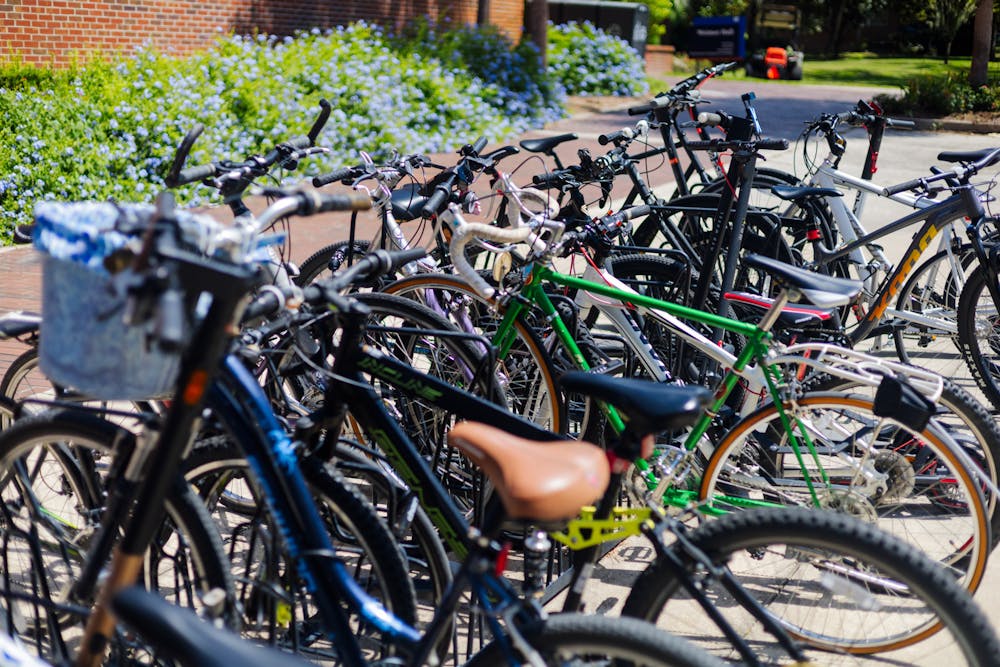Noah Adelson uses a hand-me-down bike on campus. It’s a Giant Rincon Mountain Bike from the 1990s. It’s not an extravagant bike, but it’s a safe one.
A former Team Florida Club Cycling president gifted the bike to the 19-year-old UF data science sophomore at the end of Adelson’s last year. Adelson, the current president of the nearly 40-year-old club, now spends his Friday mornings cycling with other members to get pastries and coffee.
Riding a bicycle is advertised as a convenient and sustainable way to navigate the UF campus. Bike repair stations are located across campus to help students and faculty do minor repairs. However, many of the 28 stations have disappeared or are in disrepair.
About a year ago, Adelson had to put air in his tires and found one of the Fix-It bike repair stations near Yulee Pit. The station was functional, and he was able to fix his bike.
According to the UF Bikes website, 28 Fix-It stations across campus provide tools like an air pump, wrenches, screwdrivers and tire levers. The stations are free to use and are meant to help students make sure their bikes are safe.
However, not every repair station is operable. Many across campus are missing pumps or the tools necessary to do minor repairs on a bike. Additionally, some repair stations do not exist where they are said to be located based on the UF Bikes map.
When Adelson lived in Infinity Hall during his first year, he had no space to work on his bike; he discovered a repair station near his dorm but learned the pump did not work. Instead, he used it as a stand to make the adjustments on his bike himself.
“You have to have a reliable bike, and part of it is being able to maintain that bike,” Adelson said.
Adelson also warned that if resources are not accessible so students can fix their bikes, it can lead to crashes or injuries.
“Road rash is not fun, especially when it's not your fault or it's preventable,” he said. “You want to not feel like you're going to die riding your bike.”
Adelson’s bike is one of the 6,000 bikes on campus on an average day, according to an email from Amy Armstrong, a UF spokesperson. She estimates that 5% to 10% of students and faculty ride a bike at least twice a week.
The bike repair stations were first introduced in 2013 to help provide resources to the high volume of cyclists on campus. It was originally a program under the Housing and Residence Life created by Inter-Residence Hall Association students.
Some students who originally introduced the stations joined Student Government and “expanded the stations on campus as an SG project,” Armstrong said.
“The repair stations have strengths and weaknesses,” she wrote.
The pumps can be damaged by regular use, and since their introduction, parts to repair them have become more expensive. She explained that multiple organizations on campus were responsible for different stations, but the specific organizations that own those stations were not defined in her email.
Over the summer, those organizations made plans to get all stations fully operating again, Armstrong said. However, getting the parts shipped takes a while. As of right now, there aren’t any funds or plans for expansion. The goal is to fix the existing stations.
Student Body President John Brinkman wrote in an email response that SG created the bike repair stations to ensure that students can get around campus.
According to Brinkman, SG has “ordered all the parts to fix the bike repair stations that SG owns.” Brinkman did not state the number of stations SG owns.
“We are in a partnership with TAPS [UF Transportation and Parking Services] to get them repaired by the end of September,” he wrote. “We also have a plan going forward for continued maintenance with TAPS.”
While the repair stations are a necessary resource for students who use bikes, when repaired, they could help encourage sustainability on campus.
Leslie Thiele, a political science professor and director of sustainability studies, rides his bike to campus every day — a routine he has maintained for 33 years. Cycling allows him to limit his carbon footprint.
While Thiele has the tools to do most of his bike repairs at home, he believes the repair stations should “exist in abundance” if they will be used by students and faculty, he said.
Thiele once visited a repair station that didn’t have a pump when he had a flat tire,” he said. “It was a frustrating experience. They should fix the ones that exist to a level of at least providing pumps and the information about where they are.”
Whether SG provides more operational bike repair stations depends on the frequency at which students and faculty use them.
With more operational bike repair stations, students and faculty could make better use of their bikes and promote sustainable habits, Thiele said. He appreciates how the Office of Sustainability works to make UF’s campus more bike-conscious and hopes students take advantage of SG’s bike repair in the Reitz.
However, Theiele believes encouraging students and faculty to be sustainable is still an ongoing task.
“We have to not only sustain the planet,” he said. “We have to sustain our lives.”
Delia Rose Sauer is a junior journalism student and the Fall 2024 University General Assignment Reporter. This is her second semester on the University Desk. In her free time, she's drawing on Procreate, crocheting or exploring music genres.






